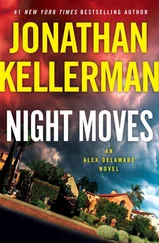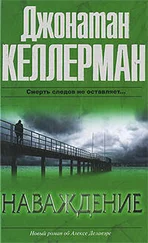Jonathan Kellerman, Jesse Kellerman
Crime Scene
To Faye
— JONATHAN KELLERMAN
To Gavri
— JESSE KELLERMAN
Don’t make assumptions.
Every now and then, I remind myself of that.
Every now and then, the universe does the reminding for me.
When I meet new people, they’re usually dead.
A young white male lies on his back in the parking lot of a Berkeley frat house. According to the license in his wallet, his name is Seth Lindley Powell. He is four months past his eighteenth birthday. The license gives a San Jose address. It’s a fair bet his parents are at that address, right now, asleep. Nobody has notified them yet. I haven’t had a chance.
Seth Powell has clean gray eyes and soft brown hair. His palms are open to the three a.m. sky. He wears a misshapen brown polo shirt over khakis. One shoelace drifts loose. Except for a few shallow abrasions on his left cheek, his face is smooth and content, with a bluish tinge. His skull, rib cage, neck, arms, and legs are intact. There’s little visible blood.
Down at the end of the driveway, beyond the yellow tape, a throng of students snap photos of Seth. And selfies. Some of them hug and weep, others just look on, curious.
Crushed red Solo cups pile high on the sidewalks. A banner strung from the eaves declares the theme: SATURDAY NIGHT FEVER. Boys slur their statements to uniformed officers. Girls in platforms fidget with the buttons of loud polyester shirts fished from the five-buck bins on Telegraph Avenue. Nobody knows what happened but everyone has a story. From a third-floor window come the lazy flickers of a disco ball nobody has thought to still.
Standing over Seth Powell’s body, I make an assumption: I wonder how I’m going to explain to his parents that their son has died of alcohol poisoning during his first week of school.
I’m wrong.
The following afternoon, a technician comes into the squad room, calls me away from my computer and down to the morgue so I can see firsthand a body cavity sloshing with busted organs; lower vertebrae punched out of alignment; a pelvis smashed to gravel, consistent with a four-story fall, the small of the back taking the full brunt of impact.
There’s a reason we do autopsies.
Toxicology confirms what Seth’s friends insisted on, what I hesitated to believe: he wasn’t a drinker. He was That Guy, caught up in righteous notions of purity. He wrote songs, they said. He took arty black-and-white photos with a camera that used actual film. Rush Week depressed him. Someone heard he went up to the roof to look at the stars.
How depressed?
At some point you need to make a decision. Boxes need checking. It says a lot about our desire for simplicity that there are an infinite number of ways to die but only five manners of death.
Homicide.
Suicide.
Natural.
Accidental.
Undetermined.
My job begins with the dead but continues with the living. The living have telephones with redial. They have regret and insomnia and chest pain and bouts of uncontrollable weeping. They ask: Why.
Ninety-nine times out of a hundred, why isn’t a real question. It’s an expression of loss. Even if I had the answer, I’m not sure anyone could stomach it.
I do the next best thing. The old switcheroo.
They ask for why . I give them how .
Knowing that it’s impossible to live without assumptions, I try to choose mine carefully. I think about the loose shoelace. I rule Seth Powell’s death an accident.
Five years on, I still think about him whenever I get a callout to Berkeley.
I don’t get called out to Berkeley often. Alameda County covers eight hundred square miles, of which Berkeley is a speck, and, compared with its neighbors, basically untouched by serious crime, unless you object to homeless people or fussy vegan reinventions of diner classics, which I don’t. Who doesn’t enjoy a good tofu Reuben?
Five years after Seth Powell’s death, near to the day, at eleven fifty-two a.m. on a Saturday in September, Zaragoza was hanging over my cubicle wall, probing the flesh behind the lower left corner of his jaw in search of the latest development that would widow his wife and orphan his kids.
He said, “Yo Clay, touch this.”
I did not look up from my work. “Touch what.”
“My neck.”
“I’m not touching your neck.”
“You can feel it if you push hard.”
“I believe you.”
“Come on, dude. I need a second opinion.”
“My opinion is that last week you asked me to touch your stomach.”
“I checked WebMD,” he said. “It’s cancer of the pharynx. Maybe salivary glands, but that’s kind of rare.”
“You’re kind of rare,” I said. My desk phone was ringing.
I pressed the speakerphone. “Coroner’s Bureau. Deputy Edison.”
“Hey there, this is Officer Schickman in Berkeley.” Friendly voice. “How are you?”
I said, “What’s up, man?”
“I’m out on a DBF here. More than likely it’s natural but he’s at the bottom of the stairs so I figure you might want to have a look.”
“Sure thing,” I said. “Hang on a sec, I’m all outta my little forms.”
Zaragoza absently handed me a blank worksheet, continued prodding his neck. “I should get an MRI,” he said.
On the speaker, Schickman said, “Sorry?”
“Never mind,” I said, picking up the receiver. “My buddy here’s got cancer.”
“Shit,” Schickman said. “Sorry to hear it.”
“It’s all right, he gets it every week. Go ahead. Decedent’s last name?”
“Rennert.”
“Spell it?”
He did. “First name Walter. Spelled like you think.”
I asked questions, he answered, I wrote. Walter Rennert was a seventy-five-year-old divorced white male residing at 2640 Bonaventure Avenue. At approximately nine forty a.m., his daughter had arrived at the house for their weekly brunch date. She let herself in with her key and found her father lying in the foyer, unresponsive. She called 911 and attempted, unsuccessfully, to resuscitate him. Berkeley Fire had pronounced him dead at ten seventeen.
“She’s next of kin?”
“Believe so. Tatiana Rennert-Delavigne.” He spelled it without being asked.
“Is there a primary doctor?”
“Uh... Clark. Gerald Clark. I haven’t been able to reach him. Office is closed till Monday.”
“Any medical conditions you know about?”
“Hypertension, per the daughter. He took meds.”
“And you said he’s at the bottom of the stairs?”
“Nearish. I mean, he’s lying there.”
“Meaning...”
“Meaning, that’s his location. It doesn’t look to me like he slipped.”
“Uh-huh,” I said. “Well, we’ll have a look.”
“Okay. Listen, I’m not sure I should be mentioning this at all, but his daughter’s pretty insistent he was murdered.”
“She said that?”
“What she told dispatch. ‘You have to come, my father’s been murdered.’ Something like that. She told patrol the same thing when they got here. They called me.”
So far I liked Schickman. All indications were that he had his shit together. I attributed the hesitation in his voice to uncertainty over how to interact with the daughter, rather than any concern that she might be correct.
“You know how it is,” he said. “People get upset, say things.”
“Sure. Can I get your badge number real quick?”
“Schickman. S-C-H-I–C-K-M-A-N. Sixty-two.”
Berkeley. While I get that it’s not for everybody, you have to admit there’s a certain boutique charm in a PD small enough to have two-digit badge numbers.
Читать дальше












